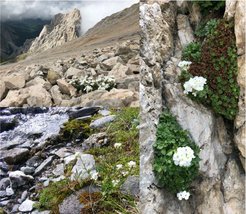Adaptation of perennial Arabis alpina along a latitudinal gradient in Scandinavia
Supervision: The project will be supervised by Andrea Fulgione at the Max Planck Institute for Plant Breeding Research.
Abstract: Understanding how species spread across the landscape, how they colonized new habitats and adapted to novel environments are central goals of evolutionary genetics. One prominent example of recent, large-scale remodeling of species ranges is the postglacial colonization of Northern Europe from unglaciated refugia. As species migrated northwards, they experienced the novel, stressful, high latitude environment, which likely exerted strong selective pressures on the colonizing lineages, and may have resulted in phenotypic shifts at adaptive traits. In this project, the student will address how plants adapt to extremely stressful high latitude environments characterized by very short growing seasons. Fifteen Scandinavian populations of the perennial plant Arabis alpina will be studied along a latitudinal transect from southern to northern Norway. Genomic information generated from all populations will be used to model their post-glacial colonization history, using computational and population genetics methods. As A. alpina migrated northwards, adaptation to more severe environmental conditions may have resulted in a latitudinal cline of allele frequencies at adaptive loci, or at fitness-related traits. The student will address this scenario by combining the analysis of allele frequencies as a function of latitude, and scoring phenotypic variation in flowering time and growth-related traits, which vary extensively in these populations. Genomic and phenotypic data will be addressed to highlight adaptive latitudinal clines, and to build a powerful GWAS panel. This project will reveal the biogeographic history of postglacial colonization of Northern Europe by A. alpina, and gene variants and phenotypes associated with adaptation to extreme high latitude environments.
Key publication: Durvasula, A., Fulgione, A., Gutaker, R. M., Alacakaptan, S. I., Flood, P. J., Neto, C., ... & Hancock, A. M. (2017). African genomes illuminate the early history and transition to selfing in Arabidopsis thaliana. Proceedings of the National Academy of Sciences, 114(20), 5213-5218.
Link to the Fulgione group homepage: https://www.mpipz.mpg.de/fulgione

